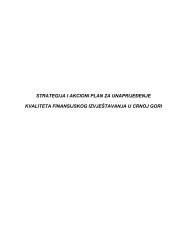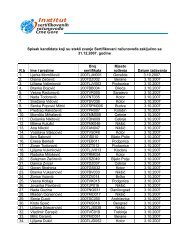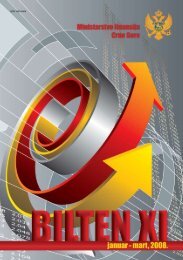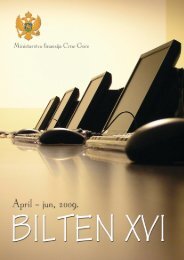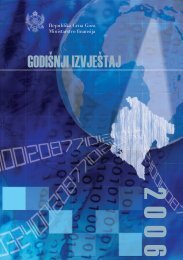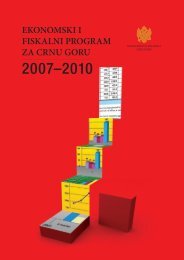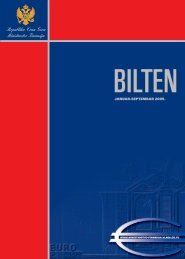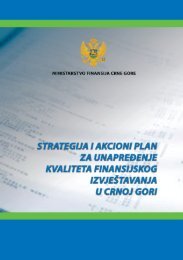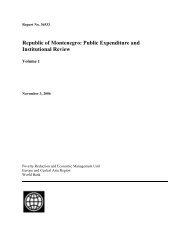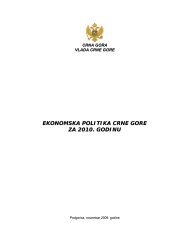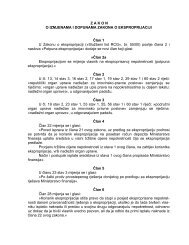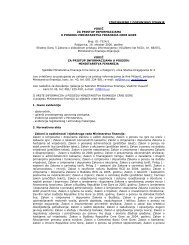director - Ministarstvo finansija
director - Ministarstvo finansija
director - Ministarstvo finansija
Create successful ePaper yourself
Turn your PDF publications into a flip-book with our unique Google optimized e-Paper software.
Guidebook to the tax system<br />
BULLETIN OF THE MINISTRY OF FINANCE/JANUARY-MARCH 2006<br />
Tax advances on income from independent activities are paid<br />
monthly to the amount of 1/12 of the tax liability under the annual<br />
tax return for preceding year.<br />
Tax advance which is paid on this account shall be deemed a tax<br />
credit with respect to tax liability under the tax return.<br />
Taxpayers who earn income from intermittent independent activities<br />
shall be recognized standard expenses to the amount of 35%<br />
of earned income (if their real expenses are not documented), while<br />
the tax rate is 20%.<br />
Lump sum taxation of income from independent activities<br />
- A taxpayer, whose total turnover in a year preceding the year<br />
for which the tax is determined (or whose expected turnover in the<br />
moment of start-up of activities) is less than Euro 18.000 can be allowed<br />
to pay the annual lump sum tax.<br />
The Rulebook on Lump Sum Taxation of Income from Independent<br />
Activities regulates in detail the lump sum taxation, and the<br />
taxpayers are classified in 4 groups depending on the type of their<br />
activity, while each group is classified into 4 subgroups depending<br />
on the amount of achieved turnover.<br />
Taxation of Property and Property Rights- Income from property<br />
and property rights includes revenues earned on the basis<br />
of: renting of movable and immovable property; time-bound cession<br />
of copyrights, industrial property rights and other rights.<br />
Tax base (taxable income) for payment of the tax on income<br />
from property and property rights includes a difference between<br />
total income earned from renting of movable and immovable property,<br />
copyrights and industrial property rights and total expenses<br />
incurred with respect to earning such income in the same tax period.<br />
Expenses incurred on the basis of property and property rights<br />
include real expenses incurred with respect to earning such income<br />
(if they are documented) or standard expenses to the amount of<br />
35% of the income earned from property and property rights, except<br />
for income from renting of rooms, apartments and houses for<br />
holiday to travelers and tourists, where standard expenses amount<br />
to 50% of the income earned.<br />
Tax advance on income from property and property rights is calculated,<br />
deducted and paid in the course of the year by a payer of<br />
related receipts (legal person or entrepreneur), or a taxpayer (in case<br />
of direct income earning) concurrently with collection of such<br />
receipts by applying the tax rate of 20% on the taxable income.<br />
Taxation of income from capital -Income from capital includes<br />
revenues on the basis of: interests; shares in profit earned by<br />
members of management board or employees in cash or in shares;<br />
use of property or services by capital owners or co-owners for their<br />
private purposes.<br />
Payer of income from capital is obliged to calculate, withhold<br />
and pay a tax on income from capital concurrently with payment<br />
of revenues at the rate of 15%, except for income from interests made<br />
by non-residents (tax rate is 5%).<br />
Taxation of income from capital gains - Capital gain includes<br />
income from sale of a real estate or share in the legal persons'<br />
property and securities (assets) if the sale is performed within 2<br />
years from the day of acquisition of such assets.<br />
Taxable income from capital gain is a difference between sale<br />
and acquisition price of the assets, adjusted by increase of retail prices<br />
from the day of acquisition to the day of sale of such assets.<br />
A resident pays the tax concurrently with filing of the annual<br />
tax return, while the taxable income from capital gain is included<br />
in the tax base to the amount of 50%.<br />
Tax on capital gains earned by a non-resident is paid at the source<br />
at the rate of 15%.<br />
Filing of Annual Tax Return - Personal income taxpayer is<br />
obliged to file annual tax return to the competent tax authority<br />
upon expiration of a fiscal year by end April of the current year for<br />
a preceding year.<br />
The taxpayer calculates personal income tax by himself in the<br />
tax return, by applying progressive tax rates on the tax base, while<br />
the total tax so calculated is reduced by the tax advances paid at<br />
sources.<br />
If, by paying the tax advances, a taxpayer overpaid the tax under<br />
the tax return, the amount of overpaid tax is refunded to him<br />
at his personal request or is included in a tax advance for the next<br />
tax period.<br />
Persons exempt from filing of annual tax return - Annual<br />
tax return is not filed by a taxpayer for income earned on the basis<br />
of: personal income stemming from employees' wages, if such income<br />
is earned with one employer in the same accounting period; income<br />
from other independent activities other than main activity of<br />
the taxpayer; income from capital; income from independent activities<br />
taxed at the flat-rate, where the tax advances paid are deemed<br />
to be finally determined tax on that account.<br />
6. CONTRIBUTIONS FOR COMPULSORY<br />
SOCIAL INSURANCE<br />
Payment of contributions for compulsory social insurance is regulated<br />
by the following laws: Law on Pension and Disability Insurance<br />
(Official Gazette of RM, No. 54/03, 39/04 and 79/04), effective<br />
from 1 January 2004, Law on Health Insurance (Official<br />
Gazette of RM, No. 39/04) effective from 10 June 2004, and Law<br />
on Social Insurance Contributions (Official Gazette of RM, No.<br />
23/93 and 45/98), the section relating to unemployment insurance<br />
contributions, while its underlying solutions have been in force<br />
since 1993.<br />
The above Laws govern all issues relating to payment of contributions<br />
for respective types of compulsory social insurance (insured,<br />
payer, base, rate, manner of payment etc.). Main principle is<br />
15



